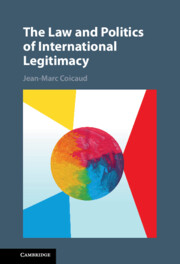Refine search
Actions for selected content:
567 results
4 - Criteria for Evaluating Mechanisms for Representation of Future Generations
- from Part II - International Law and Institutions
-
- Book:
- Representing Future Generations
- Published online:
- 19 September 2025
- Print publication:
- 09 October 2025, pp 93-115
-
- Chapter
- Export citation
8 - A UN Special Envoy for Future Generations
- from Part III - Case Studies
-
- Book:
- Representing Future Generations
- Published online:
- 19 September 2025
- Print publication:
- 09 October 2025, pp 200-219
-
- Chapter
- Export citation
Qui devrait légalement être considéré comme lobbyiste au Québec ?
-
- Journal:
- Canadian Journal of Political Science/Revue canadienne de science politique / Accepted manuscript
- Published online by Cambridge University Press:
- 09 September 2025, pp. 1-13
-
- Article
- Export citation
Deliberative Judicial Review
- Part of
-
- Journal:
- Federal Law Review / Volume 53 / 2025
- Published online by Cambridge University Press:
- 03 September 2025, e2
-
- Article
-
- You have access
- Open access
- HTML
- Export citation
Information Fragmentation and Global Governance in Hard Times
-
- Journal:
- Ethics & International Affairs , First View
- Published online by Cambridge University Press:
- 22 August 2025, pp. 1-14
-
- Article
-
- You have access
- Open access
- HTML
- Export citation
Does this democracy work? Measuring reliability, Trojan horses and the fundamental problem of evaluation
-
- Journal:
- Economics & Philosophy , First View
- Published online by Cambridge University Press:
- 19 August 2025, pp. 1-25
-
- Article
-
- You have access
- Open access
- HTML
- Export citation
Conclusion
-
- Book:
- Grains of Conflict
- Published online:
- 23 August 2025
- Print publication:
- 31 July 2025, pp 225-236
-
- Chapter
- Export citation
16 - Change and International Legitimacy
- from Part V - International Legitimacy and Change
-
- Book:
- The Law and Politics of International Legitimacy
- Published online:
- 14 July 2025
- Print publication:
- 24 July 2025, pp 301-317
-
- Chapter
- Export citation
6 - Implications for Political Legitimacy and the Theory of Legitimacy
- from Part II - Political Legitimacy and Theory of Politics
-
- Book:
- The Law and Politics of International Legitimacy
- Published online:
- 14 July 2025
- Print publication:
- 24 July 2025, pp 92-98
-
- Chapter
- Export citation
1 - Political Legitimacy as an Intellectual Journey
- from Part I - Setting the Stage
-
- Book:
- The Law and Politics of International Legitimacy
- Published online:
- 14 July 2025
- Print publication:
- 24 July 2025, pp 11-23
-
- Chapter
- Export citation
3 - The Legitimacy–Law Nexus
- from Part I - Setting the Stage
-
- Book:
- The Law and Politics of International Legitimacy
- Published online:
- 14 July 2025
- Print publication:
- 24 July 2025, pp 39-46
-
- Chapter
- Export citation
Conclusion
-
- Book:
- The Law and Politics of International Legitimacy
- Published online:
- 14 July 2025
- Print publication:
- 24 July 2025, pp 488-491
-
- Chapter
- Export citation
2 - Orders in Transition and Implications for Political Legitimacy
- from Part I - Setting the Stage
-
- Book:
- The Law and Politics of International Legitimacy
- Published online:
- 14 July 2025
- Print publication:
- 24 July 2025, pp 24-38
-
- Chapter
- Export citation
17 - Change of International Order and Legitimacy
- from Part V - International Legitimacy and Change
-
- Book:
- The Law and Politics of International Legitimacy
- Published online:
- 14 July 2025
- Print publication:
- 24 July 2025, pp 318-349
-
- Chapter
- Export citation
4 - Theory of Politics and Political Legitimacy
- from Part II - Political Legitimacy and Theory of Politics
-
- Book:
- The Law and Politics of International Legitimacy
- Published online:
- 14 July 2025
- Print publication:
- 24 July 2025, pp 49-67
-
- Chapter
- Export citation
5 - Political Legitimacy as Evaluation and Judgment
- from Part II - Political Legitimacy and Theory of Politics
-
- Book:
- The Law and Politics of International Legitimacy
- Published online:
- 14 July 2025
- Print publication:
- 24 July 2025, pp 68-91
-
- Chapter
- Export citation
Introduction
-
- Book:
- The Law and Politics of International Legitimacy
- Published online:
- 14 July 2025
- Print publication:
- 24 July 2025, pp 1-8
-
- Chapter
-
- You have access
- HTML
- Export citation
21 - Elements of a Critical Philosophy of International Law
- from Part VI - Criticism and Reconstruction of the Legitimacy of International Law
-
- Book:
- The Law and Politics of International Legitimacy
- Published online:
- 14 July 2025
- Print publication:
- 24 July 2025, pp 392-412
-
- Chapter
- Export citation

The Law and Politics of International Legitimacy
-
- Published online:
- 14 July 2025
- Print publication:
- 24 July 2025
2 - Institutions and Institutional Genes
-
- Book:
- Institutional Genes
- Published online:
- 03 June 2025
- Print publication:
- 26 June 2025, pp 59-90
-
- Chapter
- Export citation
